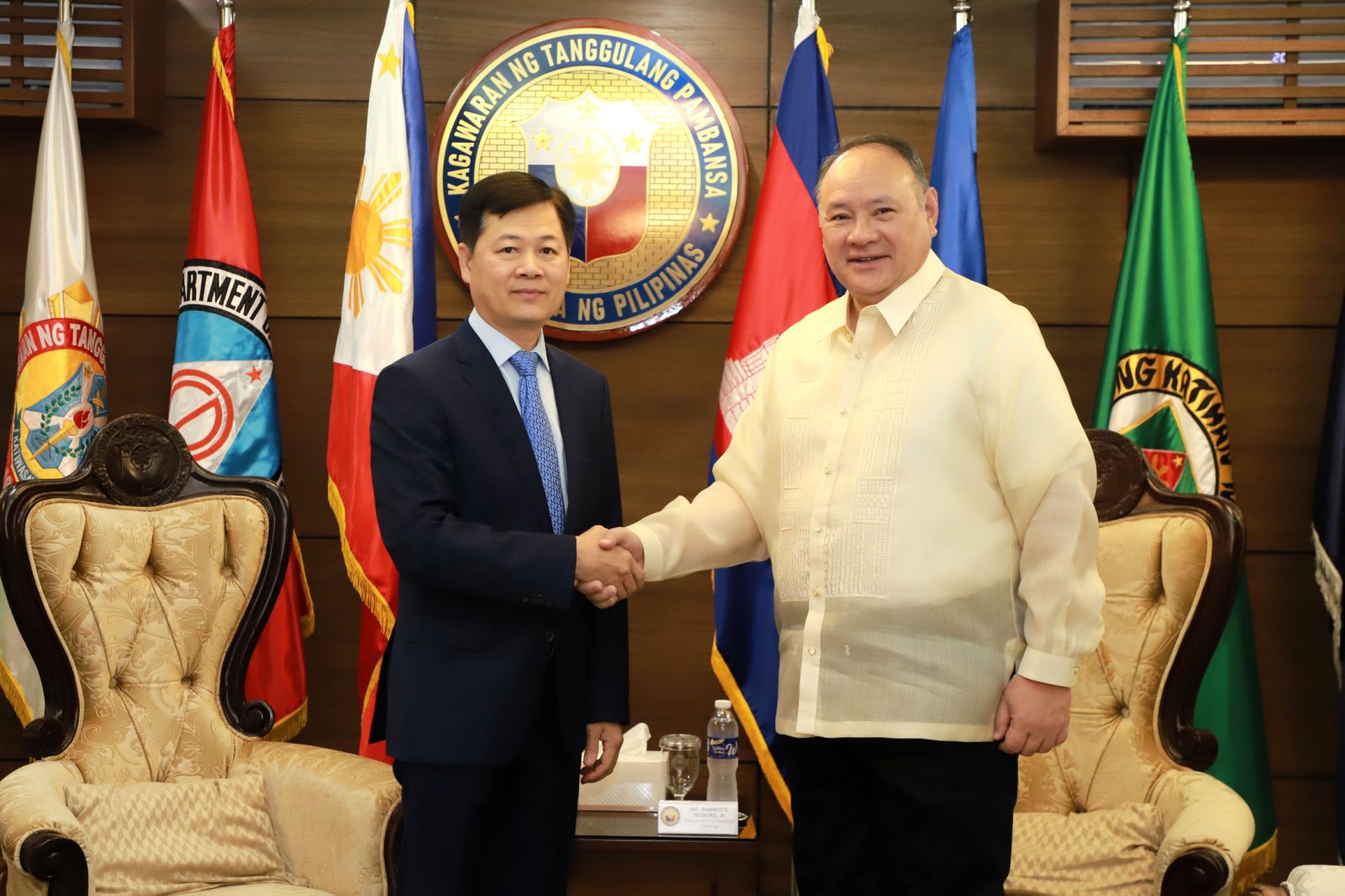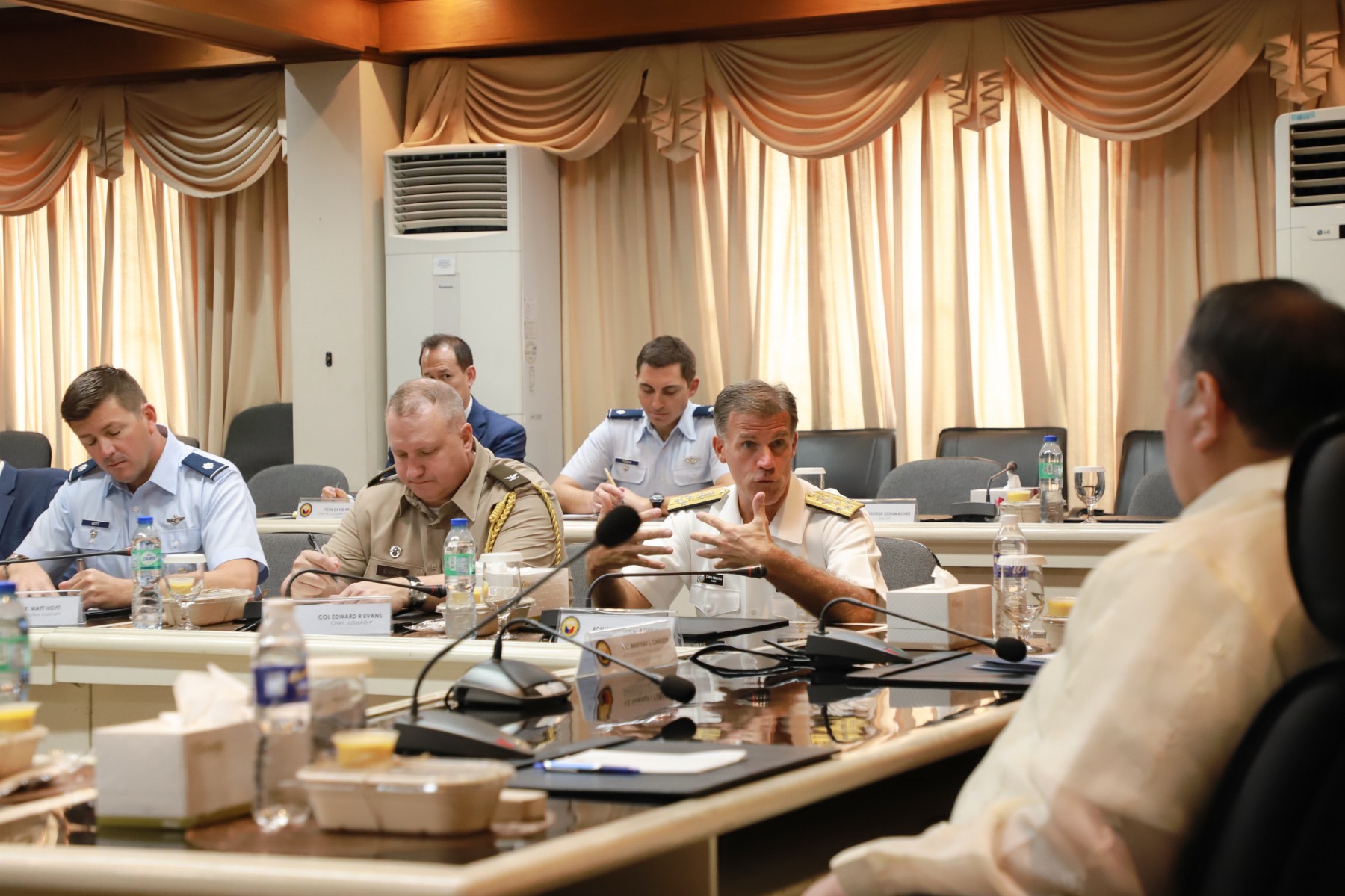Philippines turns to Cambodia, US, UK to boost defense capabilities

As the Philippines continues to fortify its defense and security capabilities, the Department of National Defense (DND) forged stronger alliance with three other nations that it believes can help achieve its goals: Cambodia, United States, and United Kingdom.
Defense Secretary Gilberto Teodoro Jr. met with Cambodian Ambassador to the Philippines Phan Peuv at Camp Aguinaldo in Quezon City on Monday, March 18, to strengthen the two countries’ bilateral cooperation in the field of cybersecurity, humanitarian mine action, and disaster risk reduction among others.
“With the Philippines and Cambodia as the two ASEAN Member States that ratified the Convention of Cluster Munitions (CCM), both officials expressed their concerns over pressing matters of illegal mine and explosives usage and committed to work together against command-detonated mines and Improvised Explosive Device (IEDs), which affect civilians and communities,” Defense spokesperson Arsenio Andolong said on Tuesday, March 19.
The CMM is an international treaty of more than 100 states which prohibits all use, stockpiling, production and transfer of cluster munitions. A cluster munition is a weapon consisting of a container or dispenser from which many submunitions or bomblets are scattered over wide areas. Many submunitions are unreliable and fail to explode, thus, creating a potential humanitarian impact on civilians both during as well as long after the conflict ends.
The envoy invited Teodoro to attend Cambodia’s hosting of the Fifth Review Conference (5RC) of the Convention on the Prohibition of the Use, Stockpiling, Production and Transfer of Antipersonnel Mines and on Their Destruction, also known as “Siem Reap-Angkor Summit on a Mine-Free World” in November this year.
“Both sides looked forward to conducting working-level discussions on the said cooperative initiatives during the upcoming hosting of the DND of the 4th Philippines-Cambodia Joint Defense Cooperation Committee (JDCC) Meeting this year,” Andolong noted.
Gibo meets US INDOPACOM chief; US defense exec notes logistics challenges in EDCA sites
Meanwhile, Teodoro also met with Adm. John C. Aquilino, commander of the US Indo-Pacific Command (INDOPACOM), last March 13.
They discussed the strengthening of the Philippine defense capabilities and the overall national defense system as Teodoro highlighted the implementation of the Comprehensive Archipelagic Defense Concept (CADC) as a key strategy in achieving the goal.

The CADC is a new defense concept formulated by Teodoro which aims to protect the country's entire territory, including its exclusive economic zone (EEZ).
Teodoro and Aquilino agreed to fast-track the finalization of the General Security of Military Information Agreement (SOMIA), a framework of cooperation between the Philippines and the United States that aims to protect classified military information.
“This agreement would establish a framework for information technology collaboration between the two armed forces,” Andolong said.
In a separate visit, US Assistant Secretary of Defense for Acquisition and Sustainment Christopher J. Lowman talked about ways to improve the logistical capabilities in various Enhanced Defense Cooperation Agreement (EDCA) sites with DND Assistant Secretary for Logistics, Acquisition, and Self-Reliant Defense Posture Joselito B. Ramos on March 15.
EDCA was signed by the Philippines and US in 2014 to allow Washington to rotate its troops in Manila for an extended stay, and to build and operate facilities on AFP bases for both countries’ units.
There are a total of nine EDCA locations so far.
The first five identified EDCA sites include the Fort Magsaysay in Nueva Ecija; Basa Air Base in Pampanga; Antonio Bautista Air Base in Palawan; Benito Ebuen Air Base in Mactan, Cebu; and Lumbia Air Base in Cagayan de Oro City.
Meanwhile, four additional sites were named as part of the expanded implementation of EDCA namely the Naval Base Camilo Osias in Sta. Ana, Cagayan; Camp Melchor Aquino in Gamu, Isabela; Balabac Islands in Palawan; and Lal-Lo Airport in Cagayan.
Ramos shared with his US counterpart the challenges faced by the DND in terms of ensuring adequate logistics, transportation, resupply, overhaul, and maintenance concerning the projects at EDCA sites, which proved to be crucial especially with the upcoming large-scale war games between the AFP and US military next month, the Balikatan Exercise.
“Both sides committed to addressing the capability gaps of the EDCA sites, and emphasized that sustaining regional cooperation between like-minded countries will further enhance interoperability,” Andolong noted.
UK eyes expanded presence in Indo-Pacific
The United Kingdom is keen on establishing an expanded presence in the Indo-Pacific region and it wants to discover potential defense cooperation opportunities with the DND.
This was raised by Dame Sarah MacIntosh, UK’s Deputy National Security Adviser (DNSA) for International Affairs, during her courtesy visit to Camp Aguinaldo where she was met by DND Senior Undersecretary Irineo C. Espino.
“The discussions focused on shared security challenges, particularly the West Philippine Sea issue,” Andolong bared.
Espino emphasized the DND's commitment to defend the country’s sovereignty through actions like challenging infringements and deploying naval and coast guard assets. He highlighted how these efforts align with the CADC defense strategy.
Meanwhile, Macintosh underscored UK's commitment to strengthening defense relations with the Philippines.
“She noted the increased presence of UK vessels and personnel in the Indo-Pacific, along with various joint exercises, as actions that demonstrate the UK's commitment under the ‘Deter, Defend, and Compete’ pillar of its 2023 Integrated Review Refresh national security strategy,” Andolong said.